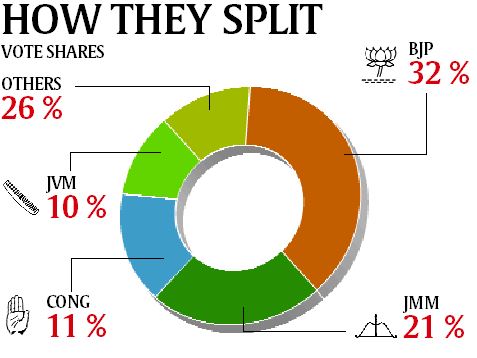BJP got it almost all right, but failed to win tribal vote
Of the 28 reserved ST seats in the state, the BJP won 11, only 2 more than what it won in 2009.
 BJP supporters celebrate at Albert Ekka Chowk in Ranchi after the results on Tuesday. (Source photo by Partha Paul)
BJP supporters celebrate at Albert Ekka Chowk in Ranchi after the results on Tuesday. (Source photo by Partha Paul)
The Bharatiya Janata Party (BJP) might have emerged as the single largest party in Jharkhand, but that has not eclipsed the resistance of Jharkhand Mukti Morcha (JMM) which held on to its 2009 tally of 18 seats, thanks to a polarisation of votes on the adivasi/non-adivasi lines.
It seems the BJP, in its efforts to consolidate its traditional Hindu votebase, left space for the JMM to reach out to the tribal sections. To put it more bluntly, the BJP could not reach out to the tribals as the JMM did.
Following a rumour that the BJP could consider propping up a non-tribal CM, the JMM and CM Hemant Soren had whipped up sentiments about the party’s alleged plans to amend the state’s tenancy laws and portrayed the BJP as a party of outsiders. The results show the Sorens might have succeeded, atleast partially, to turn the adivasis against the BJP.
Of the 28 reserved ST seats in the state, the BJP won 11, only 2 more than what it won in 2009. On the other hand, the JMM managed to win 13 this time, three more than it did in 2009. The JMM lost three seats in the Santhal Pargana, but made it up by winning two seats it lost in 2009 in its former bastion Kolhan, which was the epicentre of the statehood movement.
In fact, the JMM’s return to Kolhan seems to have hit the BJP the most. The party’s two potential CM candidates Arjun Munda and former home secretary J.B. Tubid lost from Kharsawan and Chaibasa, respectively. The JMM lost its Ghatsila seat, but reclaimed Manoharpur, Majhgaon and Chakradharpur—all ST seats— from the BJP.
So, despite increasing its Santhal Pargana tally from two to seven, the BJP managed to win only two ST seats from the region. The JMM too suffered losses in key seats. It lost stronghold Tundi, once the base of Shibu Soren’s movement against moneylenders, to AJSU Party’s Raj Kishore Mahato.
Meanwhile, the Congress failed to win a single ST seat despite actively wooing adivasis, bringing the number of ST seats won by parties other than JMM or BJP from nine in 2009 to four.
As for the Muslim equation, BJP’s arithmetic has paid off, but only partially. The party managed to retain Rajmahal, which has a significant number of Muslim voters. At Pakur, Madhupur and Jamtara, the BJP had hoped that division of votes among multiple Muslim candidates of various parties would help its cause, but it managed to win only Madhupur.





- 01
- 02
- 03
- 04
- 05




























